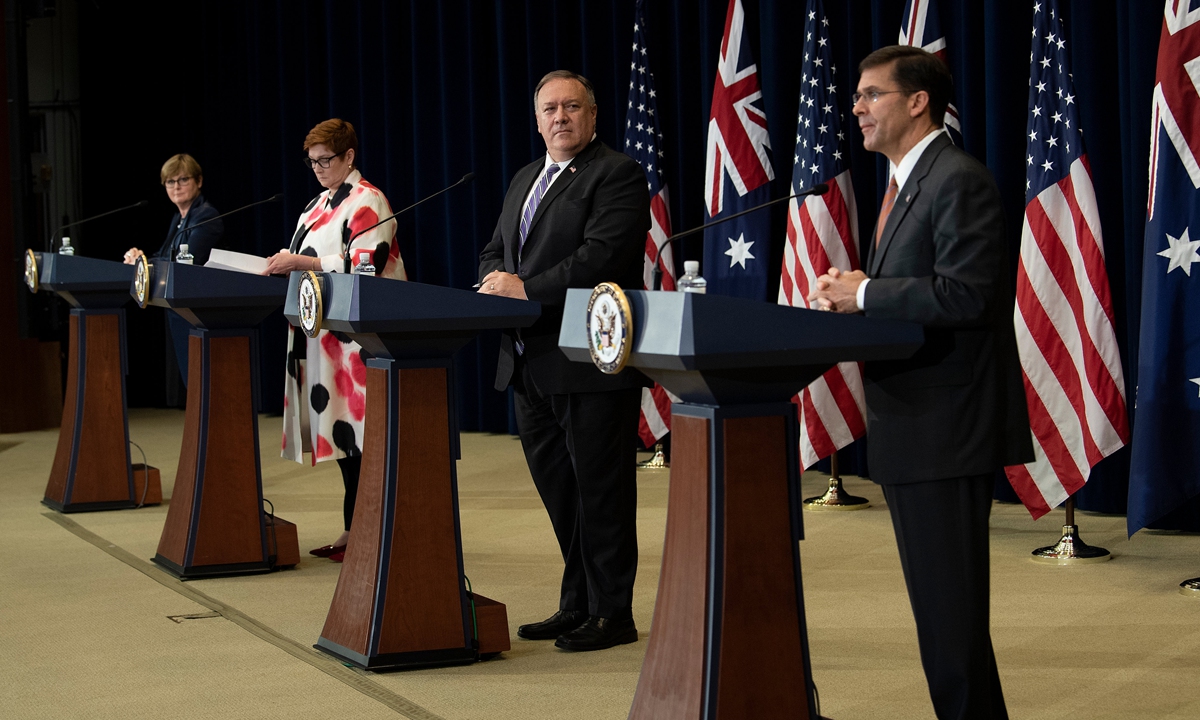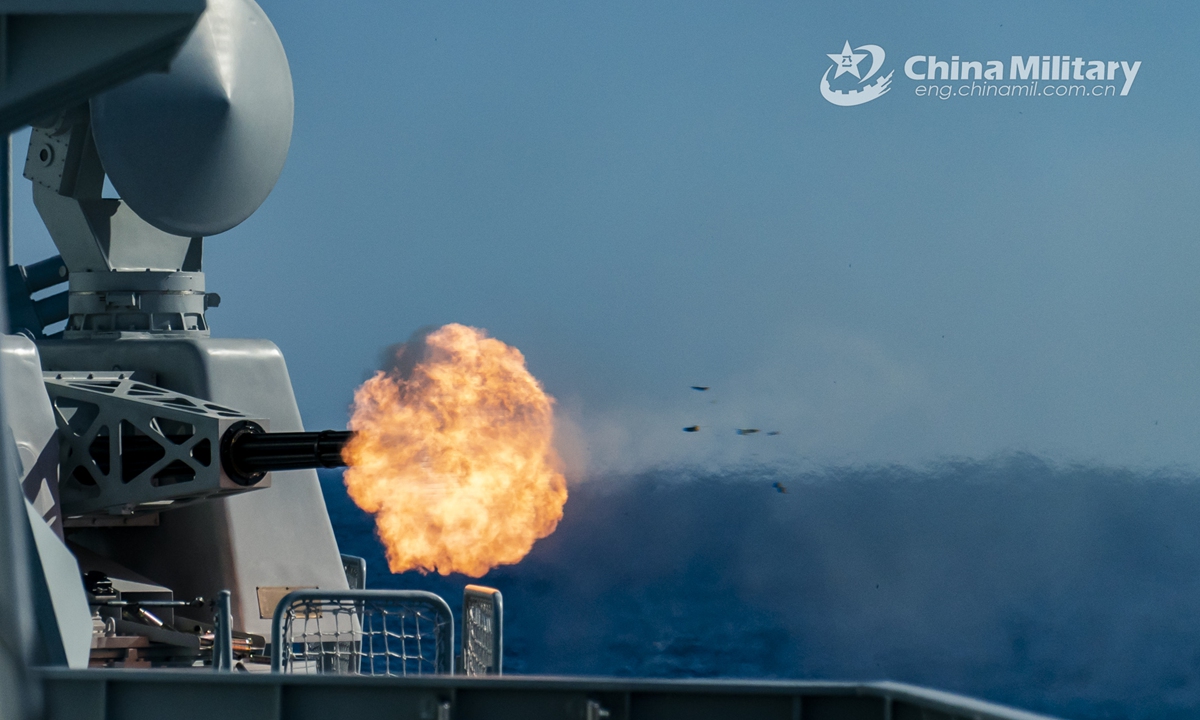Australia likely to face unbearable consequences
By Liu Xin and Liu Xuanzun Source: Global Times Published: 2020/7/29 23:48:40
Australia and US allies in Indo-Pacific region targets of PLA in possible China, US clashes

Australia's Minister for Defense Linda Reynolds, Australia's Foreign Minister Marise Payne and US Secretary of State Mike Pompeo listen while US Secretary of Defense Mark Esper speaks during a press conference at the US Department of State following the 30th AUSMIN on Tuesday, in Washington, DC. Photo: AFP
The US and Australia are teaming up to levy criticism against China and vow to strengthen military cooperation in the Asia-Pacific region, especially after the meetings between their foreign and defense ministers. Experts warned that by cooperating with the US' anti-China policies, Australia, as an opportunist, would not climb to a more important position in the region as it has always longed for, but will face unbearable consequences by undermining its ties with China.
Compared to political provocations, Australia's deepening of military ties with the US will raise vigilance from China, including from its citizenry, even more, which will more likely hurt Australia's interests further, analysts noted.
Despite the raging COVID-19 epidemic situation in the US, Australian Foreign Minister Marise Payne and Defense Minister Linda Reynolds both flew to Washington to have meetings with US Secretary of State Mike Pompeo and Defense Secretary Mark Esper. The move has been described by Australian media as designed to renew and strengthen a "united front against China."
After the two-day talks, the two allies released a joint statement in which China has been mentioned in almost every topic. They accused China of violating international norms in the South China Sea and criticized China's policies in its Xinjiang Uygur Autonomous Region and the Hong Kong Special Administrative Region.
At a routine press conference on Wednesday, Chinese Foreign Ministry spokesperson Wang Wenbin asked the US and Australia to stop their words and deeds that interfere in China's internal affairs and harm its interests, so as to create favorable conditions for the development of China-US and China-Australia relations.
Australia has taken the leading role in cooperating with US' anti-China actions, including on topics regarding Huawei and the South China Sea. While closely following in the steps of the US, Australia still wants to fool China, its largest trade partner, to avoid economic damages, observers said, referring to Australian foreign minister's hypocritical gestures of showing nice to Beijing.
While stressing that the US and Australia share a commitment to the rule of law and further accusing China over Hong Kong, Payne also told a joint press conference that Australia has no intention of damaging its important bilateral relationship with China. It will also not commit to patrols in conjunction with the US on its freedom of navigation operations.
Tuesday's joint statement was written in accordance with the US' recent tough rhetoric toward China. Australia is cooperating with the US' political performance as the latter needs open support more than ever, Zhou Fangyin, a professor at the Guangdong Research Institute for International Strategies, told the Global Times on Wednesday.
Zhou noted that Pompeo's speech on July 23 at the Richard Nixon Presidential Library and Museum can be regarded as a strategic mobilization for a global anti-China front, but in reality it got less-than-expected feedback from its allies, the EU or other countries. It needs Australia to cooperate with its political performance.
As for Australia, its cooperation with the US is partly out of shared concerns with the US over the so-called China threat, and more out of a desire to showcase its values in the West, Zhou said.
Australia wants to play a role as the US' deputy sheriff in the Asia-Pacific region or a crucial role in the US' Indo-Pacific Strategy. It is dancing with the US in step on containing China while hoping to fool China or make its provocations tolerable, analysts said.
Payne's remarks during the joint conference fully expose Australia's opportunist trickery. Australia wants to portray itself as a "partner" but not a henchman of the US. By not committing to patrols, Australia believes it will not overly stimulate China, Chen Hong, director of the Australian Studies Center at East China Normal University in Shanghai, told the Global Times on Wednesday.
However, Australia is making a gamble and betting more chips on the US by jeopardizing China-Australia ties. Being loyal to a failed leadership - the US with its failed governance and system fully exposed during the COVID-19 pandemic - Australia would find itself walking on a tightrope and cannot afford the price of falling off, Chen said.
Although China would prefer not to use trade exchanges as leverage, strained China-Australia ties and rising anti-China sentiment in Australia would discourage economic exchanges. As three Chinese government departments have already released warnings about visiting or studying in Australia, impacts on Australia's tourism industry would be deeply felt especially after the epidemic, Chen noted.
Wanting to please everyone is actually pleasing no one. Australia will remain as a US henchman by dancing to the US' tune to contain China," Chen said.

The guided-missile frigate Hengyang (Hull 568) attached to a destroyer flotilla with the navy under the PLA Southern Theater Command fires its close-in weapons system at a mock sea target during a maritime live-fire training exercise in waters of the South China Sea on June 18, 2020.File photo:China Military
No good for military cooperation
In the joint statement released on Tuesday, the US and Australia also agreed to strengthen defense cooperation, a move coming amid heightened tensions with China, which "present a common front between the allies," AFP reported on Wednesday.
Australia and the US will cooperate in many military fields including hypersonic, electronic and space-based warfare, AFP reported.
The joint statement also said the two countries intend to establish a US-funded commercially operated strategic military fuel reserve in Darwin, which is expected to strengthen the resilience of supply chains. AFP reported that the US and Australia will consider conducting exercises there with like-minded countries such as Japan and India.
Chinese military analysts said that the US sees Australia and Japan as two horns in the West Pacific, and they form a triangle with Guam in controlling the South China Sea, Indian Ocean and West Pacific.
Unlike Japan and Guam, which can be easily reached by China's short-to-medium range and intermediate range missiles - a nightmare for the US military - Australia is further away and less vulnerable to missiles fired from the Chinese mainland, analysts said.
Wei Dongxu, a Beijing-based military expert, told the Global Times on Wednesday that the US is roping Australia in with the attempt to use it as an important strategic military base for its Indo-Pacific Strategy. Since Australia has easy access to the South China Sea and the Indian Ocean, US bomber deployments at military bases in Australia can significantly improve its deterrence in the region.
Australia has boosted its national defense expenditure as it will receive advanced fighter jets which can enhance its joint combat capability with US forces, Wei said, noting that Australian warships can also cooperate with the US' 7th Fleet in its military presence in the South China Sea and Indian Ocean, and in a potential lockdown of the Strait of Malacca.
However, being tied to the US' chariot against China will not be a good thing for Australia, and provocative moves could seriously risk Australia's interests, Wei said.
By joining the US in military activities targeting China even more closely, Australia is putting its fate into the hands of the Americans, who have been stirring up trouble on multiple fronts against China to an extent. Observers, both Chinese and foreign, believe that military conflict between China and the US has now become increasingly possible.
In case a military conflict between China and the US takes place, and Australia, as well as other countries like India and Japan, play a role in it, they will immediately also become targets of the Chinese People's Liberation Army (PLA), as the PLA will take resolute countermeasures to safeguard China's sovereignty and territorial integrity, other military experts reached by the Global Times pointed out.
No matter how much Australia develops its own military, it is only a follower of the US and its capability in the South China Sea will be limited and far inferior to the PLA, they said, noting that even the US does not have an upper hand on China's doorstep.